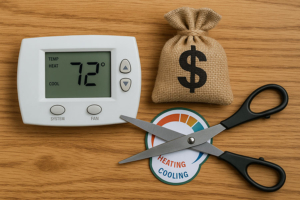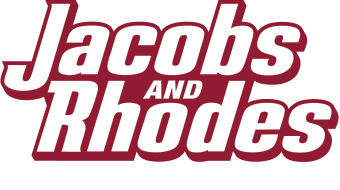Cut Heating & Cooling Costs Without Replacing Your HVAC System
 Heating and cooling account for a significant portion of your home’s energy costs, but replacing your HVAC system isn’t the only way to save money. There are several simple, cost-effective adjustments you can make to improve efficiency, reduce energy waste, and lower your utility bills—all while keeping your home comfortable year-round.
Heating and cooling account for a significant portion of your home’s energy costs, but replacing your HVAC system isn’t the only way to save money. There are several simple, cost-effective adjustments you can make to improve efficiency, reduce energy waste, and lower your utility bills—all while keeping your home comfortable year-round.
At Jacobs and Rhodes, we believe that proper HVAC maintenance and smart home practices can extend the life of your system and help you maximize savings. In this guide, we’ll focus on HVAC-specific strategies to help you cut heating and cooling costs without replacing your system.
1. Optimize Your Thermostat for Efficiency
One of the easiest ways to lower heating and cooling costs is by adjusting your thermostat settings strategically.
Recommended Thermostat Settings
- Winter: Keep it at 68°F when you’re home and lower it by 7-10°F at night or when you’re away. This can reduce heating costs by up to 10% per year.
- Summer: Set it to 78°F when you’re home and increase it when you’re away to cut cooling costs.
Upgrade to a Programmable or Smart Thermostat
A programmable thermostat lets you schedule temperature changes, so your HVAC system isn’t working harder than necessary. A smart thermostat takes it a step further by learning your habits and adjusting automatically for energy savings.
2. Keep Up with Regular HVAC Maintenance
Routine maintenance keeps your system running efficiently, reducing energy waste and preventing costly breakdowns.
Essential HVAC Maintenance Tasks
- Replace air filters every 1-3 months to improve airflow and system efficiency.
- Schedule professional HVAC tune-ups twice a year (before summer and winter) to ensure peak performance.
- Clean air vents and registers to remove dust and debris that can block airflow.
- Check for refrigerant leaks and have a professional inspect and recharge levels if needed.
Skipping maintenance can lead to higher energy bills, poor performance, and costly emergency repairs.
3. Improve Airflow and Ventilation
Proper airflow allows your HVAC system to work efficiently without overexerting itself.
Steps to Improve Airflow
- Keep vents and registers clear of furniture, curtains, and rugs to prevent airflow restrictions.
- Use ceiling fans to help circulate air more effectively—set them counterclockwise in summer to create a cooling breeze and clockwise in winter to push warm air down.
- Check and clean ductwork to prevent clogs or blockages that can reduce efficiency.
Better airflow helps maintain consistent temperatures and reduces strain on your HVAC system.
4. Seal Ductwork to Prevent Energy Loss
Leaky ducts can cause heated or cooled air to escape, making your HVAC system work harder than necessary.
How to Prevent Ductwork Energy Loss
- Inspect ducts for leaks—look for visible gaps or feel for escaping air near joints.
- Seal leaks with HVAC-specific duct sealant or metal tape (avoid standard duct tape, which degrades over time).
- Insulate exposed ducts in attics, crawl spaces, or basements to prevent energy loss.
Sealing and insulating ductwork can boost system efficiency by up to 20% and significantly lower energy costs.
5. Adjust Vent Settings Seasonally
Many homes have multiple vents in each room, and adjusting them seasonally can help direct airflow more efficiently.
- In the summer, partially close vents on the lower floors to push cool air upward.
- In the winter, partially close vents on the upper floors to encourage warm air to stay low.
Avoid completely closing vents, as this can create pressure imbalances that strain your HVAC system.
6. Insulate and Weatherproof Your Home
Your HVAC system works harder when conditioned air escapes, so improving insulation and weatherproofing can help maintain a stable indoor temperature.
HVAC-Specific Insulation Tips
- Ensure proper attic insulation to prevent heat loss in winter and heat gain in summer.
- Seal gaps around HVAC vents and registers to prevent air leaks.
- Install weatherstripping around HVAC-connected doors (like those leading to attics or crawl spaces).
Better insulation reduces temperature fluctuations and makes it easier for your HVAC system to maintain comfort without overworking.
7. Reduce Heat Gain and Loss with Window Management
Windows can be a major source of unwanted heat in the summer and heat loss in the winter, affecting how hard your HVAC system must work.
How to Optimize Windows for HVAC Efficiency
- In the summer: Keep blinds or curtains closed during the hottest parts of the day to prevent heat buildup.
- In the winter: Open curtains during the day to let in natural warmth and close them at night to retain heat.
- Use reflective window films or insulated drapes to improve energy efficiency.
By managing sunlight exposure, you can reduce the strain on your HVAC system and lower energy bills.
8. Reduce Humidity for Better HVAC Performance
High indoor humidity levels make your home feel hotter in the summer and colder in the winter, causing you to adjust the thermostat more than necessary.
How to Control Humidity for Efficiency
- Use a dehumidifier in summer to reduce moisture and make your home feel cooler.
- Run exhaust fans when cooking or showering to prevent excess humidity.
- Ensure proper drainage around your HVAC system to avoid moisture buildup.
Lower humidity means you can set your thermostat higher in summer and lower in winter without sacrificing comfort.
9. Upgrade to More Efficient HVAC Components
Even if you’re not replacing your entire HVAC system, upgrading individual components can improve efficiency.
Energy-Efficient HVAC Upgrades
- Smart thermostats – Learn your habits and adjust temperatures for optimal energy savings.
- High-efficiency air filters – Improve airflow and reduce strain on your system.
- Zoning systems – Allow different areas of your home to be heated or cooled separately, reducing energy waste.
These upgrades can enhance your HVAC system’s performance and lower operating costs without requiring a full system replacement.
Final Thoughts: Small Changes, Big Savings
You don’t have to replace your HVAC system to enjoy lower energy bills. By optimizing thermostat settings, improving insulation, maintaining your system, and making small efficiency upgrades, you can significantly reduce heating and cooling costs.
At Jacobs and Rhodes, we specialize in HVAC maintenance, duct sealing, airflow optimization, and energy-efficient solutions to help homeowners save money while staying comfortable.
📞 Want to maximize your HVAC efficiency? Contact Jacobs and Rhodes today to schedule an inspection or maintenance service!
Contents
- 1 1. Optimize Your Thermostat for Efficiency
- 2 2. Keep Up with Regular HVAC Maintenance
- 3 3. Improve Airflow and Ventilation
- 4 4. Seal Ductwork to Prevent Energy Loss
- 5 5. Adjust Vent Settings Seasonally
- 6 6. Insulate and Weatherproof Your Home
- 7 7. Reduce Heat Gain and Loss with Window Management
- 8 8. Reduce Humidity for Better HVAC Performance
- 9 9. Upgrade to More Efficient HVAC Components
- 10 Final Thoughts: Small Changes, Big Savings


